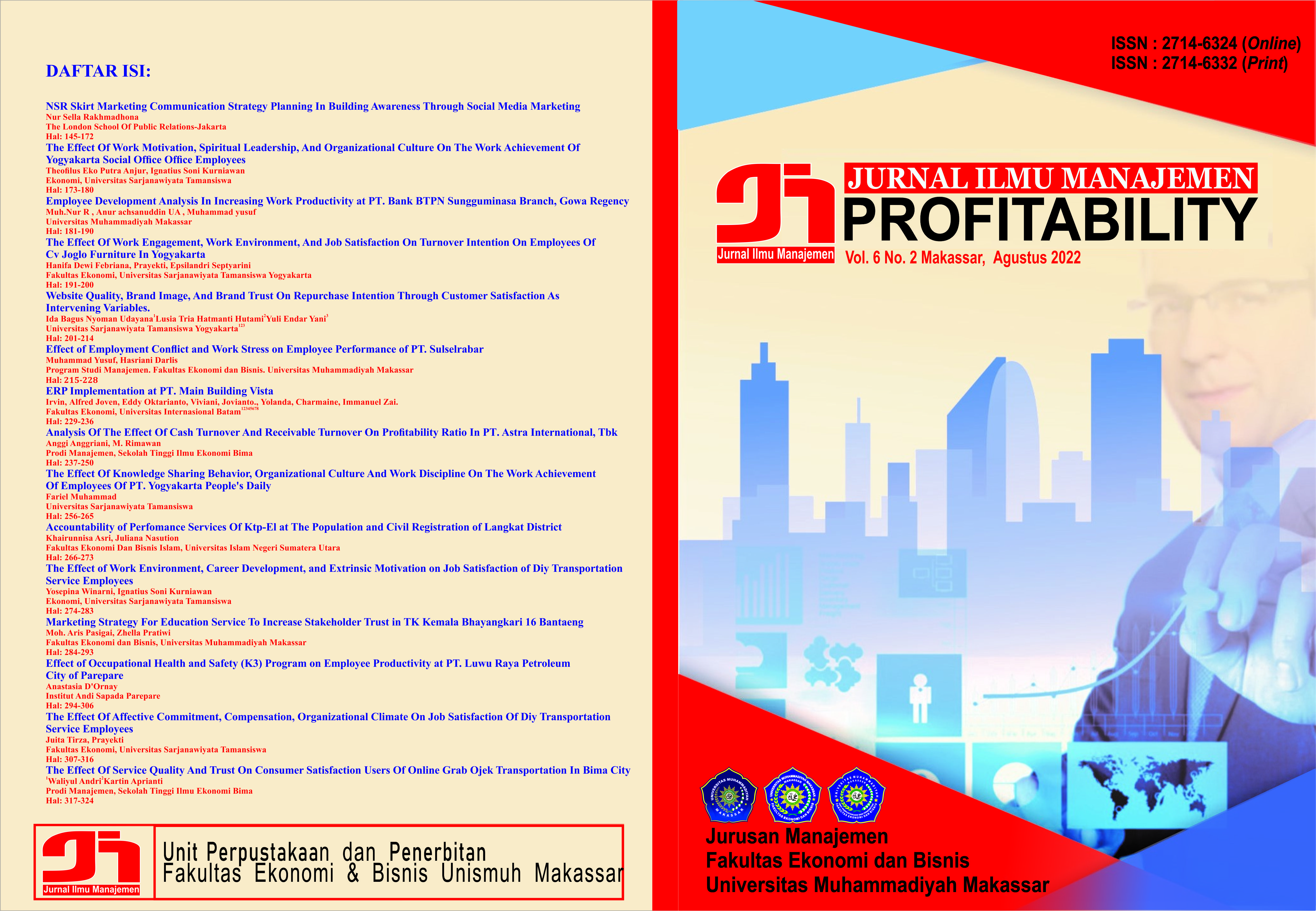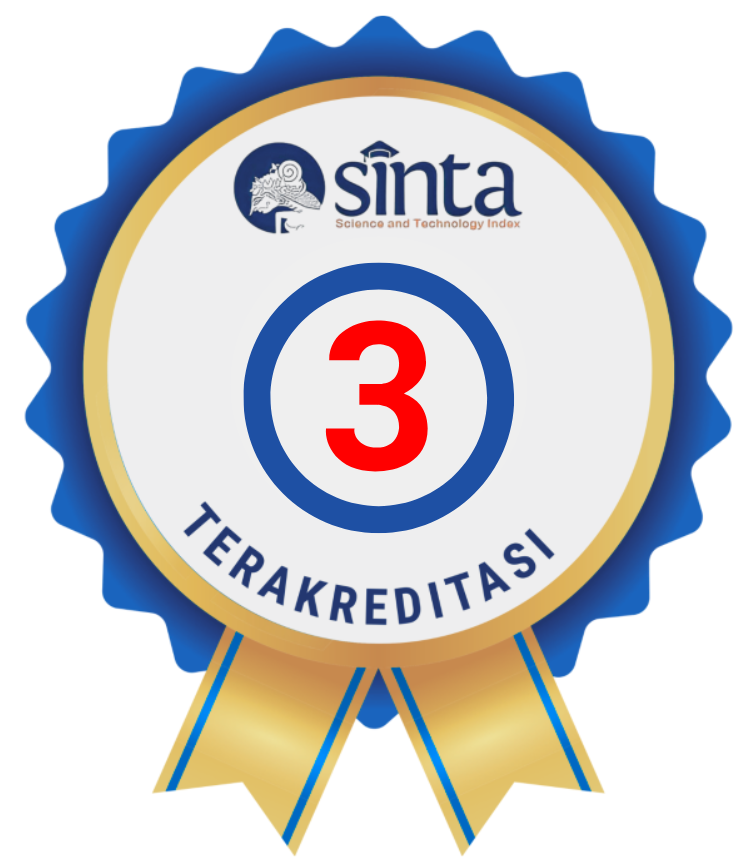The Effect Of Work Motivation, Spiritual Leadership, And Organizational Culture On The Work Achievement Of Yogyakarta Social Office Office Employees
DOI: https://doi.org/10.26618/profitability.v6i2.8457
NSR Organizational Culture, Work Motivation, Spiritual Leadership, Employee Performance
Abstract
The purpose of this study was to determine the effect of work motivation, spiritual leadership, and organizational culture on employee performance at Kantor Dinas Sosial Kota Yogyakarta. The method used in this study is a quantitative method using multiple linear regression statistical analysis to analyze the effect of the independent variable on the dependent variable in the study. The population in this study were all employees at Kantor Dinas sosial Kota Yogyakarta, with a sample size of 58 respondents. The results of this study indicate that work motivation, spiritual leadership, and organizational culture have a positive and significant influence on employee performanceReferences
Adler, N. J., & Jelinek, M. (1986). Is "Organization Culture” Culture Bound? Human Resource Management, 25(1), 73–90.
Alimuddin, A. (2019). Kepemimpinan Spritual. Kelola: Journal of Islamic Education Management, 4(2), 159–170. https://doi.org/10.24256/kelola.v4i2.905
Boone, L. E., & Kurtz, D. L. (2002). Pengantar Bisnis. Jakarta: Erlangga.
Brahmasari, I. A., & Suprayetno, A. (2008). Pengaruh Motivasi Kerja, Kepemimpinan dan Budaya Organisasi Terhadap Kepuasan Kerja Karyawan serta Dampaknya pada Kinerja Perusahaan (Studi kasus pada PT. Pei Hai International Wiratama Indonesia). Jurnal Manajemen & Kewirausahaan, 10(2), 124–135. https://doi.org/10.36805/manajemen.v2i1.181
Fry, L. W. (2003). Toward a theory of spiritual leadership. Leadership Quarterly, 14(6), 693–727. https://doi.org/10.1016/j.leaqua.2003.09.001
Girsang, W. S. (2019). Pengaruh Budaya Organisasi dan Komitmen Terhadap Kinerja Karyawan RS Putri Hijau No. 17 Medan Wulan. AJIE - Asian Journal of Innovation and Enterpreneurship, 4(2), 159–170.
Hasibuan, M. (2002). Organisasi dan Motivasi. Jakarta: Bumi Aksara.
Juanita, S. M., Subiyanto, D., & Kurniawan, I. S. (2021). Pengaruh Motivasi dan Komitmen terhadap Prestasi Kerja Pegawai Dinas Perizinan dan Penanaman Modal Daerah Istimewa Yogyakarta (DPPM DIY). Journal Competency of Business, 5(1), 36–47.
Kakiay, A. N. (2017). Pengaruh Kepemimpinan Spiritual Dan Kepuasan Kerja Terhadap Kinerja Guru Performance. Jurnal Psikologi, 10(2), 148–151.
Kreitner, R., & Kinicki, A. (2014). Perilaku Organisasi (9th ed.). Jakarta: Salemba Empat.
Luhur, R. Y. (2014). Pengaruh Kepemimpinan, Motivasi Kerja Dan Lingkungan Kerja Terhadap Kinerja Karyawan Pada Biro Pengawasan Dan Pemeriksaan PT Bank Panin Tbk. Jurnal OE, VI(3), 327–344.
Ndraha, T. (2003). Teori Budaya Organisasi. Jakarta: PT Rineka Cipta.
Nowack, K. (2004). Does leadership practices affect a psychologically healthy workplace?
Paesal, A. A. (2021). Pengaruh Motivasi Terhadap Kinerja Karyawan Pada PT. PLN Parepare. Decision: Jurnal Ekonomi Dan Bisnis, 2(2), 171–176.
Poerwadarminta. (2004). Kamus Besar Bahasa Indonesia. Jakarta: Balai Pustaka.
Reksohadiprodjo, Sukanto, & Handoko, T. H. (2002). Organisasi Perusahaan (2nd ed.). Yogyakarta: BPFE.
Rismayadi, B., & Maemunah, M. (2016). Pengaruh Motivasi Kerja, Kepemimpinan dan Budaya Organisasi Terhadap Kepuasan Kerja Karyawan serta Dampaknya pada Kinerja Perusahaan (Studi kasus pada PT. Concord Indonesia). Jurnal Manajemen & Bisnis Kreatif, 2(1), 124–135. https://doi.org/10.36805/manajemen.v2i1.181
Riyadi, S. (2011). Pengaruh Kompensasi Finansial, Gaya Kepemimpinan, dan Motivasi Kerja Terhadap Kinerja Karyawan pada Perusahaan Manufaktur di Jawa Timur. Jurnal Manajemen Dan Kewirausahaan, 13(1). https://doi.org/10.9744/jmk.13.1.40-45
Robbins, S. P., & Judge, T. A. (2013). Organizational Behavior. Boston: Pearson.
Rondonuwu, J. Y., Areros, W. A., & Sambul, S. A. P. (2017). Pengaruh Kepemimpinan Spiritual terhadap Kinerja Karyawan Pada PT. Ciputra International Proyek City of Blessing Citraland Manado. Jurnal Administrasi Bisnis Unsrat, 5(6), 1–9.
Ryan, R. M., & Deci, E. L. (2000). Intrinsic and Extrinsic Motivations: Classic Definitions and New Directions. Contemporary Educational Psychology, 25(1), 54–67. https://doi.org/10.1006/ceps.1999.1020
Schein, E. H. (2004). Organizational Culture and Leadership. San Fransisco: Jossey-Bass.
Sedarmayanti. (2017). Pendekatan dalam penilaian prestasi kerja. Journal of Chemical Information and Modeling.
Siagian, S. (2002). Kiat Meningkatkan Produktivitas Kerja. Jakarta: Rineka Cipta.
Sinetar, M. (2001). Spiritual Intelligence, Kecerdasan Spiritual Belajar Dari Anak yang Mempunyai Kesadaran Dini. Jakarta: Elek Media Komputindo.
Stoner, J. A. F., Freeman, R. E., & Gilbert, D. R. (1995). Management. New Jersey: Prentice Hall, Inc.
Sulistyo, H. (2009). Analisis Kepemimpinan Spiritual Dan Komunikasi Organisasional Terhadap Kinerja Karyawan. Jurnal Ekonomi Dan Bisnis, 10(2), 311–321.
Suwandi, S. (2016). Pengaruh Budaya Organisasi terhadap Prestasi Kerja Karyawan melalui Kepuasan Kerja. Analitika: Jurnal Magister Psikologi UMA, 8(2), 140–147.
Suwati, Y. (2013). Pengaruh Kompensasi Dan Motivasi Kerja Terhadap Kinerja Karyawan Pada Pt. Tunas Hijau Samarinda. EJournal Ilmu Administrasi Bisnis, 1(1), 41–55.
Thoha, M. (2004). Perilaku Organisasi, Konsep Dasar dan Aplikasinya. Jakarta: Raja Grafindo Persada.
Tobroni. (2005). The Spiritual Leadership. Malang: UMM Press
Downloads
Published
Issue
Section
License
Authors who publish with Jurnal Ilmu Manajemen Profitability agree to the following terms:
Copyright of the articles remains with the authors.
Authors grant the journal the right of first publication with the work simultaneously licensed under a Creative Commons Attribution-NonCommercial 4.0 International License (CC BY-NC 4.0). This license allows others to:
Share (copy and redistribute the material in any medium or format)
Adapt (remix, transform, and build upon the material)
as long as they give appropriate credit to the original author(s) and source, provide a link to the license, and indicate if changes were made. Non-commercial use only.
Authors are permitted to:
Distribute their published work (e.g., post it to an institutional repository or publish it in a book), with an acknowledgment of its initial publication in this journal.
Enter into separate, additional contractual arrangements for the non-exclusive distribution of the journal’s published version of the work (e.g., post it to a class website or institutional archive).
For permissions to use the content published in this journal beyond the scope of the license (e.g., commercial purposes), please contact the editorial office via the journal email.
License Details:
This journal is licensed under a Creative Commons Attribution-NonCommercial 4.0 International License (CC BY-NC 4.0).












